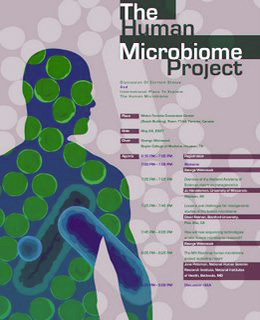The microbiome refers to the collection of all the gene sequences from a community of microbes in the human body. The microbiome has many effects on the human body and may promote cancer progression or aid in controlling cancer. The interactions between the microbiome, diet, host factors, drugs, and cell interactions are complex. Studying the nature of these interactions will require a systems approach.
The microbiome may interact with cancer in two ways: direct interaction (between microbes residing in tissues where cancer emerges), or indirect interaction (between the microbiome and a cancer living in a different tissue). Metastases can carry bacteria from the microbiome of primary tumors to distal tissues.
The gut microbiota is closely involved in the development and regulation of the immune system. The immune system is a fine-tuned balance. It must be activated to fight infections, but then deactivated when the threat is overcome to avoid damaging the body’s tissues. Inflammation is an essential feature of the immune response and can alter the composition of the microbiome so that it can either promote or act against cancer. Some antigens from gut microbes could be similar to cancer antigens resulting in training the immune system to fight cancer.
Patients treated with antibiotics before immunotherapy or chemotherapy fared poorer than patients without antibiotic treatment. The antibiotics may have eliminated beneficial bacteria. Determining the specific species of bacteria responsible has been challenging. In two studies, researchers collected fecal samples from patients ready to receive an immunotherapeutic drug. Both studies identified certain bacterial species present in more significant numbers in patients who responded positively to the drug.
There is still much to learn about the microbiome’s effect on cancer progression before treatment strategies can be developed. Some clinical trials are already taking place even though the microbiome’s mode of action on cancer is still largely unknown. The following are a few proposed microbiota-oriented interventions that could improve immunotherapy treatment:
- Fecal microbiota transplant from patients that have responded to immunotherapy
- Prebiotics and diet to promote the growth of beneficial bacteria or starve detrimental bacteria
- Antibiotics that destroy detrimental bacteria
- Probiotics that contain beneficial bacterial
- Drugs based on bacterial metabolic products that improve anti-tumor immunity or lessen the detrimental effects of chemotherapeutics.
Regarding the featured image courtesy of the National Institutes of Health:
The Common Fund’s Human Microbiome Project (HMP) developed research resources to enable the study of the microbial communities that live in and on our bodies and the roles they play in human health and disease. HMP has now transitioned from Common Fund support.
References
- Williams, Shawna. “This is your Microbiome on Drugs.” The Scientist, July/August 2019, pp. 38-45. . https://www.the-scientist.com/features/how-the-microbiome-influences-drug-action-66081
- Xavier, J. et al. “The Cancer Microbiome: Distinguishing Direct and Indirect Effects Requires a Systemic View.” Trends in Cancer, March 2020, vol. 6, no. 3 https://www.cell.com/action/showPdf?pii=S2405-8033%2820%2930017-0
Fessler, Jessica, et al. “Exploring the Emerging Role of the Microbiome in Cancer Immunology.” Journal for Immunotherapy of Cancer. https://doi.org/10.1186/s40425-019-0574-4
